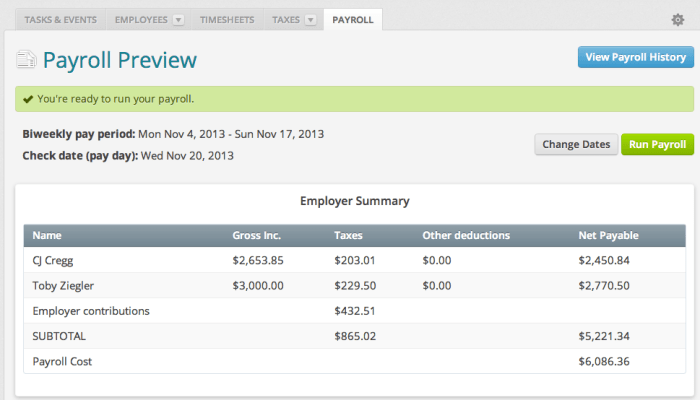Best Payroll Service For Small Business: Running a small business is a rollercoaster ride. You’re constantly juggling tasks, from marketing and sales to customer service and operations. But one crucial task that often gets overlooked is payroll. It’s a complex process that requires meticulous attention to detail, compliance with ever-changing regulations, and a lot of time.
This is where payroll services come in.
Payroll services are designed to simplify the payroll process for small businesses, taking the burden off your shoulders and allowing you to focus on what matters most: growing your business. From time and attendance tracking to tax filing and direct deposit, these services offer a comprehensive solution for all your payroll needs.
But with so many options available, how do you choose the best payroll service for your small business? We’ll explore the key features to consider, the factors to weigh, and the best practices to ensure seamless payroll management.
Payroll: The Backbone of Your Small Business

Payroll is more than just a routine task; it’s the lifeblood of your small business. It ensures your employees get paid accurately and on time, fostering employee morale and loyalty. Furthermore, it’s crucial for maintaining compliance with labor laws and minimizing legal risks.
Enhance your insight with the methods and methods of Best Payroll Service For Small Business.
However, managing payroll can be a significant challenge for small business owners, especially when juggling multiple tasks and limited resources.
Benefits of Using a Payroll Service
Outsourcing payroll to a reputable service can offer several benefits, simplifying your operations and providing peace of mind.
- Accurate and Timely Payments:Payroll services are designed to ensure accurate calculations and timely payments, reducing errors and the risk of penalties.
- Compliance with Labor Laws:Navigating the complex world of labor laws can be overwhelming. Payroll services stay updated on regulations, ensuring your business remains compliant and avoids costly fines.
- Reduced Administrative Burden:By outsourcing payroll, you free up valuable time and resources to focus on other core aspects of your business.
- Improved Efficiency and Productivity:Automating payroll processes eliminates manual errors and reduces the time spent on paperwork, boosting efficiency and productivity.
- Enhanced Security:Payroll services employ robust security measures to protect sensitive employee data from unauthorized access or breaches.
Key Features of Payroll Services
Navigating the complex world of payroll can be a daunting task for small business owners. Thankfully, payroll services offer a streamlined solution, automating crucial processes and ensuring compliance. These services come equipped with a range of essential features that cater to the specific needs of small businesses.
Time and Attendance Tracking
Time and attendance tracking is a fundamental aspect of payroll accuracy. It ensures that employees are paid correctly for the hours they work.
- Automated Time Tracking:Payroll services often integrate with time and attendance software, allowing employees to clock in and out electronically, eliminating manual errors and ensuring accurate time records.
- Overtime Calculation:Payroll services automatically calculate overtime pay based on predefined rules, ensuring compliance with labor laws and preventing costly errors.
- Leave Management:Features like leave tracking and approval workflows streamline the process of managing employee leave requests, ensuring accurate deductions and payroll calculations.
Tax Filing and Compliance
Payroll services handle the complex task of tax filing and compliance, relieving small businesses of significant administrative burdens.
- Tax Withholding and Payment:Payroll services automatically calculate and withhold federal, state, and local taxes from employee paychecks, ensuring timely and accurate tax payments.
- Tax Reporting:They generate and file necessary tax forms, such as W-2s and 1099s, ensuring compliance with IRS regulations.
- Tax Updates:Payroll services stay updated on tax law changes, ensuring that your business remains compliant with evolving regulations.
Direct Deposit
Direct deposit is a convenient and efficient way to pay employees, eliminating the need for paper checks and ensuring timely payments.
- Automated Transfers:Payroll services automatically transfer funds directly to employee bank accounts on designated pay dates.
- Reduced Processing Time:Direct deposit eliminates the need for manual check processing, saving time and resources for your business.
- Enhanced Security:Direct deposit reduces the risk of lost or stolen checks, ensuring secure and reliable payment delivery.
Employee Benefits Administration
Payroll services often include features for managing employee benefits, simplifying the administration process and reducing costs.
- Benefits Enrollment:Employees can enroll in benefits plans, such as health insurance and retirement plans, through a user-friendly online portal.
- Deduction Management:Payroll services automatically deduct premiums for employee benefits from paychecks, ensuring accurate and timely payments.
- Compliance with Benefit Laws:Payroll services help businesses comply with regulations related to employee benefits, such as COBRA and HIPAA.
Reporting and Analytics
Payroll services provide comprehensive reporting and analytics capabilities, offering valuable insights into payroll data.
- Payroll Summaries:Detailed reports on payroll expenses, tax withholdings, and employee earnings provide a clear picture of payroll costs.
- Time and Attendance Analysis:Reports on employee hours worked, overtime, and leave usage can help identify trends and optimize labor costs.
- Compliance Reports:Payroll services generate reports to demonstrate compliance with tax regulations and labor laws.
Factors to Consider When Choosing a Payroll Service
Choosing the right payroll service is crucial for any small business. It impacts your financial stability, compliance with regulations, and employee satisfaction. You need a solution that fits your specific needs and budget, making it essential to carefully consider several factors.
Pricing and Fees, Best Payroll Service For Small Business
Understanding the cost structure of different payroll services is essential. While some providers offer flat monthly fees, others charge per employee or per transaction. You need to analyze the pricing model and determine its suitability for your company’s size and payroll frequency.
Additionally, look out for hidden fees such as setup costs, integration fees, or fees for specific features. Compare the pricing models of various providers to identify the most cost-effective option.
Customer Support
Effective customer support is vital when navigating payroll complexities. Evaluate the availability and responsiveness of the payroll service’s support team. Consider factors like:
- Response time:How quickly do they respond to inquiries or issues?
- Availability:What are their support channels (phone, email, chat)? Are they available during your business hours?
- Knowledge base:Do they offer comprehensive online resources like FAQs or tutorials?
A reliable customer support team can help resolve payroll issues promptly, minimize downtime, and ensure compliance.
Integrations with Other Business Software
Payroll is often integrated with other business software like accounting, HR, or time tracking systems. Look for a payroll service that seamlessly integrates with your existing software to streamline processes and avoid manual data entry. This integration can save time and reduce errors, ultimately improving efficiency.
Ease of Use
The payroll service should be intuitive and easy to use, even for users without extensive technical expertise. Consider factors like:
- User interface:Is the interface clean and user-friendly?
- Navigation:Can you easily find the features you need?
- Onboarding:Does the service provide comprehensive onboarding resources and support?
A user-friendly interface minimizes training time and reduces the risk of errors.
Security and Data Privacy
Payroll data is sensitive and requires robust security measures. Ensure the payroll service provider adheres to industry-standard security protocols and complies with data privacy regulations. Look for features like:
- Data encryption:Does the provider encrypt data both in transit and at rest?
- Multi-factor authentication:Does the service require multiple authentication steps to access sensitive data?
- Regular security audits:Does the provider conduct regular security audits to identify and mitigate potential vulnerabilities?
Protecting your data is crucial to maintain employee trust and comply with regulations.
Popular Payroll Services for Small Businesses

Choosing the right payroll service for your small business can be a daunting task. With so many options available, it’s essential to carefully consider your needs and budget before making a decision. To help you navigate this process, we’ve compiled a list of popular payroll services and their key features, pricing, and pros and cons.
Popular Payroll Services
Here’s a table comparing some of the most popular payroll services for small businesses:
| Service Name | Key Features | Pricing | Pros | Cons |
|---|---|---|---|---|
| Intuit QuickBooks Payroll |
|
Starts at $45 per month |
|
|
| ADP Run Powered by Paychex |
|
Starts at $39 per month |
|
|
| Gusto |
|
Starts at $39 per month |
|
|
| Paychex |
|
Starts at $45 per month |
|
|
| ZenPayroll (now Gusto) |
|
Starts at $39 per month |
|
|
Tips for Using a Payroll Service Effectively
Choosing the right payroll service is only the first step. To truly maximize its benefits for your small business, you need to understand how to use it effectively. This means not just inputting data but also taking advantage of the various features and tools the service offers to streamline your payroll processes, ensure accuracy, and stay compliant.
Setting Up Accurate Employee Information
The foundation of accurate payroll lies in having complete and correct employee information. This includes details like name, address, Social Security number, tax withholdings, and pay rates.
- Double-check all details:Carefully review all information before submitting it to the payroll service. Errors in employee data can lead to incorrect paychecks and tax filings.
- Keep information updated:Employee information changes over time. Update addresses, tax withholdings, and pay rates promptly to avoid errors and ensure timely and accurate payments.
- Utilize employee self-service portals:Many payroll services offer employee self-service portals where employees can update their own information, view pay stubs, and access other payroll-related documents. This reduces the administrative burden on you and ensures that employees have access to their payroll information.
Understanding Tax Requirements
Payroll involves various taxes, including federal, state, and local taxes. Understanding these requirements is crucial for accurate payroll processing and compliance.
- Familiarize yourself with tax laws:Stay updated on changes in tax laws and regulations. Your payroll service can provide resources and guidance, but it’s essential to understand your responsibilities.
- Utilize tax calculators and tools:Many payroll services offer tax calculators and tools to help you determine the correct withholdings for your employees. This ensures that the right amount of taxes is withheld from each paycheck.
- Review tax filings regularly:Regularly review your tax filings to ensure accuracy and catch any errors. This proactive approach helps prevent potential penalties and audits.
Staying Compliant with Labor Laws
Payroll compliance is critical for avoiding legal issues and financial penalties. It involves adhering to federal and state labor laws regarding minimum wage, overtime pay, and other employment regulations.
- Consult with a labor lawyer:Seek legal advice to ensure you understand all relevant labor laws and how they apply to your business.
- Use the payroll service’s compliance tools:Many payroll services offer compliance tools that can help you stay updated on labor laws and ensure your payroll practices are compliant.
- Maintain accurate time records:Maintain accurate records of employee hours worked, including overtime, to ensure compliance with wage and hour laws.
Utilizing Reporting and Analytics Features
Modern payroll services offer powerful reporting and analytics features that can provide valuable insights into your payroll data.
- Track payroll expenses:Use reporting features to track payroll expenses over time and identify any trends or areas where you can optimize costs.
- Analyze employee compensation:Utilize analytics to understand employee compensation trends, identify potential salary discrepancies, and ensure fair pay practices.
- Identify potential compliance issues:Reporting features can help you identify potential compliance issues early on, allowing you to address them before they escalate.
Best Practices for Payroll Management

Payroll management is crucial for the smooth operation of any small business. It involves accurate and timely processing of employee compensation, deductions, and taxes. By implementing best practices, businesses can minimize errors, ensure compliance, and optimize their payroll processes.
Regularly Reviewing Payroll Data
Regularly reviewing payroll data is essential to identify potential errors, inconsistencies, and areas for improvement. This includes examining pay rates, deductions, taxes, and other payroll-related information.
- Analyze pay stubs:Carefully review each employee’s pay stub to ensure that all deductions and taxes are correct. Compare this information to their employment contracts and tax forms.
- Compare payroll reports:Analyze payroll reports, such as the payroll register and summary reports, to identify any discrepancies or unusual trends. Compare this information with your business’s accounting records.
- Track overtime hours:Monitor overtime hours to ensure that employees are paid correctly and that overtime costs are within budget.
Reconciling Payroll Records with Bank Statements
Reconciling payroll records with bank statements is crucial to ensure that all payroll payments have been processed correctly and that there are no discrepancies.
- Compare payroll records:Compare the payroll register to your bank statement to verify that all payroll payments have been processed and deposited into the correct accounts.
- Review deductions:Reconcile the payroll register with bank statements to ensure that all deductions, such as taxes, health insurance premiums, and retirement contributions, have been correctly deducted from employee paychecks.
- Investigate discrepancies:If discrepancies are found, investigate the cause and take corrective action to ensure that future payroll payments are processed correctly.
Implementing Internal Controls
Implementing internal controls helps to prevent errors, fraud, and other irregularities in payroll processing.
- Segregation of duties:Ensure that different individuals are responsible for different aspects of payroll processing. For example, one person should be responsible for entering payroll data, while another person should be responsible for approving payroll payments.
- Regular audits:Conduct regular audits of payroll records to identify any potential errors or fraud. This can be done internally or by an external auditor.
- Password protection:Use strong passwords to protect access to payroll systems and data. Limit access to payroll data to authorized personnel.
Staying Updated on Payroll Laws and Regulations
Payroll laws and regulations are constantly evolving. It’s important to stay updated on these changes to ensure compliance and avoid penalties.
- Subscribe to industry newsletters:Subscribe to industry newsletters and publications to stay informed about the latest payroll laws and regulations.
- Attend workshops and seminars:Attend workshops and seminars to learn about changes in payroll laws and regulations.
- Consult with a payroll expert:If you have questions about payroll laws and regulations, consult with a payroll expert.
Last Recap
Navigating the world of payroll services can seem overwhelming, but with careful consideration of your needs and a clear understanding of the available options, you can find the perfect solution to simplify your payroll process and streamline your business operations.
By choosing the right payroll service, you can free up valuable time and resources to focus on what truly matters: building a thriving and successful small business.
FAQ Summary: Best Payroll Service For Small Business
What are the most common payroll mistakes small businesses make?
Common mistakes include miscalculating wages, failing to withhold taxes correctly, and not keeping accurate records. These errors can lead to fines, penalties, and even legal issues.
How do I choose the right payroll service for my business?
Consider your business size, budget, and specific needs. Look for a service that offers features like time and attendance tracking, tax filing, direct deposit, and employee benefits administration. It’s also essential to evaluate customer support, pricing, and security.
What are the benefits of using a payroll service?
Payroll services save you time and money, reduce errors, ensure compliance with labor laws, and provide valuable reporting and analytics. They also free up your staff to focus on other critical tasks.
Can I integrate my payroll service with other business software?
Many payroll services offer integrations with popular accounting, HR, and time tracking software, streamlining your workflow and eliminating the need for manual data entry.